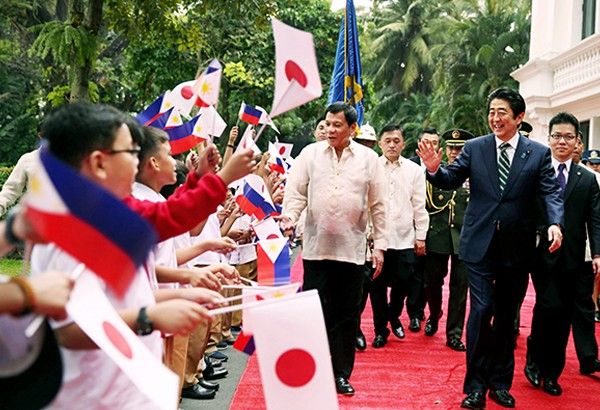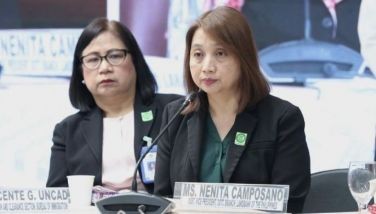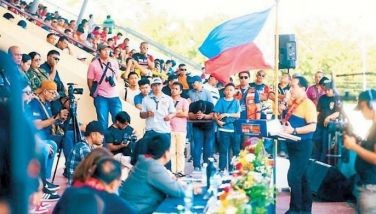Duterte, Abe want rule of law in seas

MANILA, Philippines - The need to uphold the rule of law in resolving regional conflicts highlighted the discussions yesterday between President Duterte and visiting Japanese Prime Minister Shinzo Abe at Malacañang.
Emerging from the Aguinaldo State Dining Room after a meeting that lasted for about 30 minutes, Duterte and Abe said their countries are resolved to deepen and expand relations “across a broad range of areas,” including defense and security.
The two countries are embroiled in maritime disputes with China, which is claiming almost the entire South China Sea as well as an island in the East China Sea occupied by Tokyo.
In his speech after their meeting, Duterte said the Philippines and Japan have shared interests in protecting their territories.
“As proven defense and long-time partners, the Philippines and Japan are committed to further expand and deepen our relations across a broad range of areas,” Duterte said.
The President also said he had an active discussion with the Prime Minister on enhancing maritime and security cooperation.
“As maritime nations, the Philippines and Japan have a shared interest in keeping our waters safe and secure from threats of any kind,” Duterte declared.
Abe is the first leader invited by the President to visit the Philippines. Abe has selected Manila and Davao for his first stops in his roadshow visit around the region.
Duterte stressed the need for the Philippines to seek Japan’s help in modernizing its Armed Forces in addition to previous agreements.
“Capacity-building and assets acquisition and upgrading will be a centerpiece of this collaboration. We hope to fast-track the delivery to the Philippines of key assets already in the pipeline and the acquisition of new ones,” he said.
“As we seek these new innovations to the Philippines’ capabilities, we will continue to forge ahead with our efforts to advance the rule of law in order to secure the waters in our regions,” he added.
Japan has been helping the Philippines in its modernization program. It delivered a multi-role response vessel to the Philippine Coast Guard last year to help in patrolling the West Philippine Sea. The brand new ship was named BRP Tubbataha.
Japan is set to deliver to Manila 10 more 144-ft mid-sized coast guard ships, worth P8.8 billion ($188.52 million).
The ship delivery was discussed in an 80-minute meeting between Duterte and Japanese Foreign Minister Fumio Kishida in Davao City last Aug. 11.
Abe on sea dispute
While Duterte did not mention the South China Sea dispute, Abe stressed the issue remains a major peace and stability concern in the global community.
“The issue of the South China Sea is linked directly to regional peace and stability and is a concern to the entire international community,” Abe pointed out.
Acknowledging Duterte’s move to craft a more “independent” foreign policy away from the United States, Abe said he respects the Philippine leader’s efforts to establish better relations with Beijing.
“I welcome the fact that President Duterte is making efforts to improve China-Philippines relations in light of the arbitral award,” he said, referring to the July ruling of the Permanent Court of Arbitration based in The Hague invalidating China’s massive maritime claim and reaffirming the Philippines’ maritime entitlements in the West Philippine Sea.
“The significance of the rule of law, peaceful resolution of disputes and non-militarization has been confirmed at ASEAN Related Meetings last year,” he said, noting that the same principles would be reaffirmed at this year’s ASEAN summit to be hosted by Manila. “We affirm the importance of these.”
This year also also marks the 50th founding anniversary of the regional bloc.
“Both countries being maritime nations, Japan will enhance support for capacity-building in the field of maritime security,” Abe added.
“We also had a firm exchange of views on the regional landscape and agreed to elevate cooperative relations to a higher level to address not only bilateral issues but also to work toward a resolution of regional challenges,” the Japanese leader said.
China claims almost the entire South China Sea where about $5 trillion worth of trade passes every year. Brunei, Malaysia, the Philippines, Taiwan and Vietnam also have claims on the sea believed to have rich deposits of oil and gas.
Abe also expressed his concerns over the nuclear and missile program of North Korea.
On the issue, Abe said he and Duterte have agreed on the importance of a rigorous enforcement of relevant UN Security Council resolutions.
Abe also batted for the need to boost the Regional Comprehensive Economic Partnership.
“We agreed that we would continue cooperation toward the conclusion of a quality agreement,” he maintained.
Duterte has been vocal about his support for a regional economic partnership while expressing disdain for the US-led Trans-Pacific Partnership (TPP) espoused by outgoing US President Barack Obama.
Duterte badmouthed the US president for expressing concerns over reports of rampant human rights violations in the conduct of his war on drugs.
All spruced up
In Davao City, the President’s house in Doña Luisa Subdivision Phase 1 was spruced up for Abe’s visit last night. Abe was keen on dropping by Duterte’s house as part of his two-day state visit.
There had been no renovations on Duterte’s house but its air-conditioning system had been improved.
Abe was scheduled to fly to Davao City after the dinner in Malacañang last night.
“Actually there have been no renovations or any new construction made on the house. What you see is what you get, same as before,” a source told The STAR.
The only things that were changed in the President’s house were some light bulbs that were busted.
“And they had to bring in new air-conditioning units since the ones that they have in his house were already not functioning well,” the same source said.
There was also general cleaning carried out for Abe’s visit.
And it is all systems go for the overnight stay of the Japanese prime minister in Davao City, also known as the “Little Tokyo” of the Philippines for its large population of Japanese who settled in the city before the Second World War.
Aside from visiting the President’s house, Abe is expected to meet with local business groups as well as visit Japanese World War II landmarks. – Edith Regalado
- Latest
- Trending




























